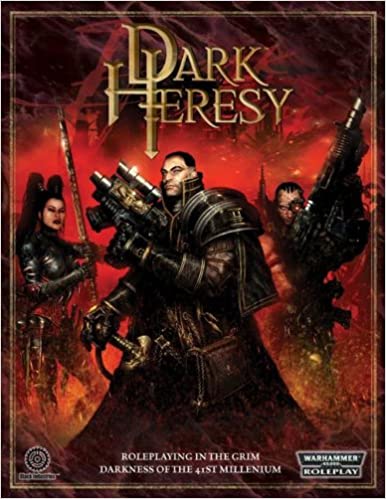I started to feel that I didn’t know roleplaying games well enough so I came up with the plan to read a roleplaying game corebook for every year they have been published. Selection criteria is whatever I find interesting.

Dark Heresy is the first in a line of Warhammer 40.000 roleplaying games that started in 2008. It was published originally by Black Industries but due to business rearrangements the entire line soon moved to Fantasy Flight Games.
Warhammer 40.000 is essentially a medieval world with scifi trappings. Ordinary people are superstitious yokels, violence is everywhere and you always need to fear for your soul. It’s a tremendously evocative concept. Each of the 40K roleplaying games picks a vantage point into this world.
Aesthetically there’s an interesting discrepancy between the visuals of 40K and the demands of roleplaying. Warhammer’s style is exaggerated and caricatured, which makes sense when you want to make distinctive miniatures. In a roleplaying game, you look at the world from a human level, starting from your own character. I found myself wondering how do these grimacing gun-wielding mutant cyborgs sit down, take a leak, eat their meals, and so on.
In Dark Heresy, the player characters are Acolytes serving an Inquisitor, tasked with rooting the forces of heresy and alien influence from the Empire. As often happens in genre fiction, although the Inquisitors come across as intolerant fanatics, the threats they combat are essentially real. There really are malignant forces out to corrupt humanity. This means that while there are moral grey areas aplenty, at the end of the day the player characters can be good guys.
As a game, Dark Heresy is principally investigation-based, although combat plays a large part as well. The player characters can be half-mechanized Tech-Priests or criminal scum but they’ve all been deputized into the Inquisition’s service. One interesting area for roleplaying is the difference in values and motivations between the characters and their employers. The game plays this up as well: The example Inquisitors serve wildly different ideas and the example adventure requires challenging authority and making independent decisions.
As often happens when I read roleplaying games, the example adventure is crucially important. By the time I got to it, I’d already read over 350 pages of Dark Heresy but I didn’t really have a clear idea of the intended playstyle. This is very typical of these games and it was a relief to get to the scenario and finally see the blow-by-blow structure of an adventure demonstrated.